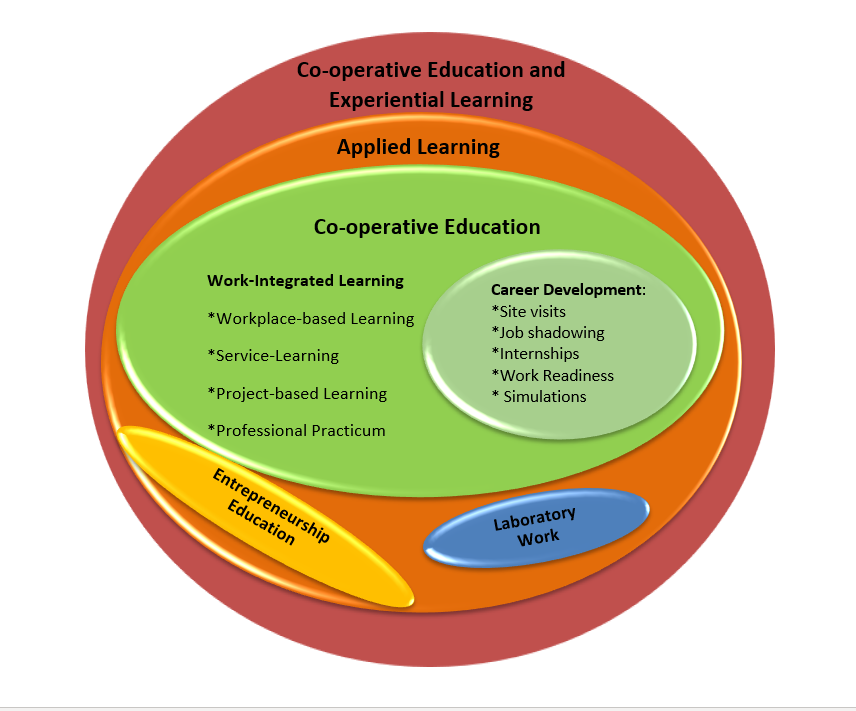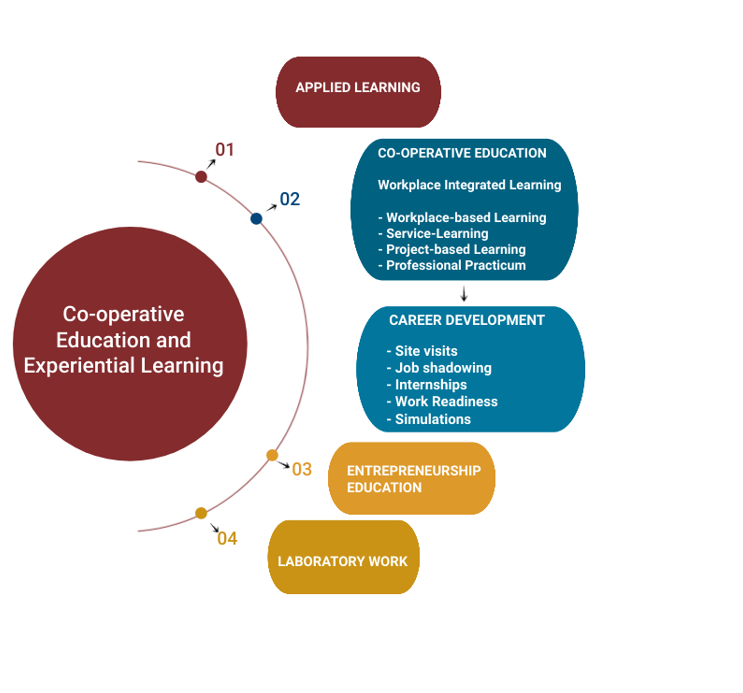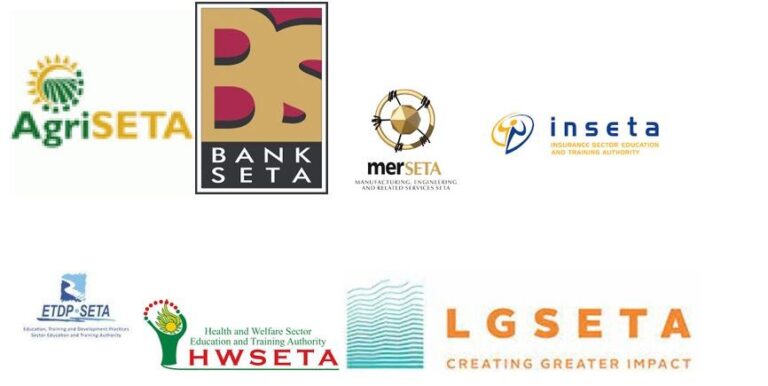About us
The Co-operative Education Directorate has continued to provide thought leadership on the implementation of Work-Integrated Learning and the establishment of partnerships with external stakeholders in both the public and private sectors. Through engagement with these external stakeholders, the institution places approximately 1500 students for Work-Integrated Learning in over 200 organisations, annually.
Even though its sister institutions have dropped Work-Integrated Learning in some of their Engineering courses, MUT has taken the bold step to, not only retain this programme, but to strengthen Co-operative Education. As such, in 2019, the MUT Senate approved a new Framework for Co-operative Education and Experiential Learning with Co-operative Education being the major portfolio that enable students to apply knowledge in practical settings would be driven. The new framework also recognises the need to enhance the employability of students. This includes a Career Development portfolio within Co-operative Education. This portfolio drives the preparation of students for an easy transition into the world of work.


WHAT WE DO

Provide leadership in Work Integrated Learning (WIL) implementation. Support Student Work Readiness skills development.
Provide student work placement support through:
- Building strategic relationships with Host Employers.
- Working with WIL Coordinators in the engagement with host employers to negotiate placement opportunities.
- Facilitating student interviews.
- Facilitating student inductions.
- Facilitating Pre-placement Site Visits (on request).Leveraging SETA grants to create placement opportunities.
- Manage Work Integrated Learning information.
- Facilitate and overseer student WIL monitoring and visitation.
Work Integrated Learning (WIL)
What is WIL and how does it work?
Work-Integrated Learning (WIL) is a methodology of curriculum design that integrates academic learning with industry-based/or community-based experiential learning that is structured, monitored and assessed to meet the outcomes of a learning programme.
WIL at MUT comprises of 2 phases:
- Work Readiness phase – Students are required to attend a 15- week Work Readiness program in preparation for their transition from campus to the work place.
- Work-based Learning phase – Students spend 3 to 12 months in the workplace (depending on the academic requirements of their qualification) under the mentorship of a WIL Coordinator as well as a workplace supervisor.
How does a student benefits from WIL?
- This is the student’s opportunity to integrate their learning with real-life work situations.
- During this period, students have an opportunity to demonstrate their abilities to potential future employers.Presented with challenging tasks, students are able to develop to their highest potential.
- Work experience is often the determining factor in whether or not new graduates find employment.
- MUT students, through Co-operative Education, often have the work experience at completion of their academic studies.
How do host employers benefit from WIL?
- The periods of work integrated learning and work equip the student with pre-qualification experience, thus enabling employers the opportunity to recruit work-ready graduates for their industry.
- Students who respond well to the work environment can be retained as full-time employees on completion of their training periods.
- Each discipline has an Advisory Committee. Employers of our students have the opportunity to be members of these committees which communicate the needs of industry to the institution.
- Through membership in these committees, industry helps to shape the training that the students receive at the institution.
- Newly graduates enter in the working environment with limited skills and ideas of what is expected from them by the employers, which is costly for the employer.
- Work integrated learning assist students in gaining the necessary skills and ideas required in the workplace in order to decrease the unnecessary cost that might affect the profit and revenue of the industry.
MEET THE TEAM
Director: Co-Operative Education
Tel: 031-9077115
Email:
Co-operative Education is a philosophy of learning that promotes the concept of enhanced learning based on a triad partnership between an educational institution, a host employer and a student.

Tel: 031-9077241
Email: zamah@mut.ac.za

Tel: 031-907 7115
Email: lmyende@mut.ac.za

Tel: 031-819 9295
Email: thulasi@mut.ac.za
The Co-op Portfolios at MUT
A. Student Placement:
1. Facilitate access to Job opportunities:
Through the Placement portfolio, we help students to access job opportunities in the following ways:
a) Help through the Co-operative Education office
We keep a CV database for our students. When one of our trusted employer partners needs to recruit students directly from us, we forward them CVs from our database. CVs are submitted via our Co-op email address coop@mut.ac.za
b) Access directly to employers
We research job opportunities and post these on our Facebook page, the MUT Co-operative Education (https://www.facebook.com/MUTcoop) for our students to apply to those employers that advertise opportunities on public platforms.
 2. Facilitate Careers’ Fair Exhibitions:
2. Facilitate Careers’ Fair Exhibitions:
Networking is one of the ways students can gain access to work opportunities. Our annual Careers’ Fair attract over forty exhibitors from public and private organizations. Over two days, our students engage directly with potential employers, drop their CVs or register their interest to work for the companies of their choice.
3. Host Company presentations:
To help our students learn more about industry, we host company presentations on campus.
Presentations are advertised on our Facebook page and through our WIL Coordinators in the faculties.
4. Negotiate projects for project-based Learning
Work-integrated learning opportunities are not always available in industry due to economic reasons. However, that is no reason for our students to be left behind. Where we are unable to get placement opportunities for our students, we let them work on projects with external organizations. This enables students to gain the skills that they would otherwise have gained in a placement while solving real life problems.
Benefits of Project-based Learning:
- Students have the opportunity to work with real organizations on real projects
- Students have an opportunity to apply critical thinking and problem-solving skills
- It opens students’ minds to entrepreneurial possibilities
B. Student Career Development:
We understand that there are huge differences between university life and the world of work. For this reason, we help our students better prepare themselves for the transition into the world of work. Our Student Career Development portfolio provides:
Work Readiness Training:
Our 15-week Work-Readiness Program has a strong practical element and covers areas such as:
Understanding Work, the Workplace and Organizations
This unit orientate students towards professional values relating to the workplace (company or industry). The work environment is vastly different from campus life, therefore for an individual to thrive in the workplace, they need to start with understanding the world of work, organisational structures as well as communication protocols within these structures.
Implementation, Productivity and Continuous Improvement
This unit teaches students skills that will help students to add value to their host company through, problem solving, critical thinking, working in teams, continuously improving the way they work and avoiding resource wastage.
Innovation principles
This unit teaches students to reflect on their work and brainstorm improvements.
Job searching strategies
A professional CV will improve a student’s chances of being called to an interview. Our CV Writing and Interview skills sessions teach students how to prepare their CVs and prepare for interviews.
Work-Readiness Peer Advice service
Our Peer Advice service helps students and graduates prepare for the transition into the world of work through:
CV and Interview Consultation Clinics
Through the CV and Interview Consultation Clinics, we help students and new graduates with CV Writing as well as Interview Skills. Students may book for individual consultations with our Work-Readiness Peer Advisors through our Facebook Page Booking system (https://www.facebook.com/MUTcoop)
MUT Radio Careers’ Slots
To familiarize our students with their respective industries, we organize informative sessions namely MUT Radio Careers’ slots. These sessions provide a platform for our students to better understand our employer partners, whether it is in person or over the phone. The aim is to offer students insights into potential employers, their expectations, and the application processes involved. These slots take place on Tuesdays of the second week, monthly on MUT Radio. During these sessions, we also go live with our Facebook page: (https://www.facebook.com/MUTcoop ). These sessions delve into the challenges of working with different students faced by employers during their WIL, shedding light on what students can anticipate and what is required of them in the professional world.
Information for employers
REMEMBER:
- MUT has NOT dropped WIL.
- Our students are still available for a full 6 to 12 months placement
- Through our Project-based Learning, our students can work with industry and communities to solve real life problems.
To recruit our students, please contact our office we will guide you through the recruitment process for our students.
Our employer partners
MUT enjoys partnerships with many public and private organizations. Our major employers as honoured by the institution in 2019 for consistently hosting our students over many years are:
The Department of Rural Development and Land Reform is one of the biggest host employers of MUT’s Civil Engineering and Surveying students. In the years 2017 and 18 DRDLR has hosted a total of 44 students. Over and above that, a total of 73 students have received bursaries from DRDLR in the years 2017 and 2018. Because of its consistent intake of MUT students, active participation in the MUT Industrial Advisory Board of both the Civil Engineering and Survey academic programs as well as the provision of guest presentations to students every year, this Government department had received a national award at the SASCE Excellence Awards in 2018 .
EThekwini Municipality hosts MUT WIL students from across the disciplines of Civil Engineering, Electrical Engineering, Nature Conservation, Public Administration and Office Technology. Several municipality staff members serve on the Industry Advisory Boards of various academic departments at MUT. They also take active part in Work Integrated Learning Imbizos thus helping MUT to continuously enhance the employability training of its students. In the years 2016 – 2018 this municipality has hosted over 68 WIL students from MUT and has consistently awarded bursaries to MUT students. Having been honoured by MUT at the 2018 SASCE national awards for Work-Integrated Learning, this municipality has continued to strengthen its MUT WIL placement.
Umgeni Water hosts MUT Work-Integrated Learning students from across the disciplines of Analytical Chemistry, Chemical Engineering, as well as Civil Engineering. Through a partnership that is formalised through an MoU between Umgeni Water and MUT, as well as annual meetings between MUT and Umgeni Water, 68 students have been hosted for Work-Integrated Learning at Umgeni Water and have been exposed to all facets of operation of water treatment plants. The Umgeni Water-MUT partnership particularly targets students that had been waiting for WIL placement for more than 2 years, thus restoring their hope and enabling them to graduate. This state –owned utility strives to provide training of the highest calibre that supports both personal and professional development of the students. Over the years, no less than 70% of the Umgeni Water intake, were offered contract or even permanent employment at Umgeni. In 2015 Umgeni Water received national recognition for its partnership with MUT.
Transnet has earned itself the accolade of being the most preferred employer by MUT students. This is because of their long-standing history with MUT and their reputation for offering permanent employment to its WIL students. For several years, Transnet had taken an average of 50 MUT Work-Integrated Learning students per year from the disciplines of Civil Engineering, Mechanical Engineering and Electrical Engineering. Transnet staff are active in the Advisory Boards of the above-mentioned disciplines. They also regularly attend the Work-Integrated Learning Imbizos that aim at improving MUT students’ employability skills. It is as a result of these activities, that Transnet had received a national recognition by the Southern Association for Co-operative Education (SASCE) in 2015, with one of its retired Training and development champions being awarded a Life-time achievement in Work-Integrated Learning.
Want To Partner With Us?
Our Engineering students spend six to twelve months on Work-Integrated Learning, doing real work and adding value to the company while they apply their theory and bring in fresh ideas to your environment.
The following are our Engineering disciplines and their WIL timeframes:
Discipline | WIL period | Level of study |
Building and Quantity Surveying | 6 months | 2nd Year |
Chemical Engineering | 12 months | 3rd Year |
Civil Engineering | 12 months | 3rd Year |
Electrical Engineering | 12 months | 3rd Year |
Mechanical Engineering | 12 months | 3rd Year |
Surveying | 12 months | 3rd year |
Discipline | WIL Period | Level of study |
Agriculture (Animal production) | 12 months | 3rd Year |
Agriculture (Plant Production) | 12 months | 3rd Year |
Analytical Chemistry | 12 months | 3rd Year |
Biomedical Technology (BHSc) | 2 X 6 months PERIOD | 3rd AND 4th year |
Environmental Health | 100 days Practicum | Year 1 to Year 3 |
ICT | 6 months | 3rd year |
Nature Conservation | 12 months | 3rd year |
Discipline | WIL period | Level |
Office Management & Technology | 3 months | 3rd year |
Public Administration | 3 months | 3rd Year |
GALLERY




Information For Students
To enquire about WIL, contact coop@mut.ac.za
To register your WIL contact: thulasi@mut.ac.za
Our Socials
Our Collaborations
MUT places significance in the placement of its students. As such, we collaborate with SETAs in creating workplace opportunities for our students. Over the years, we have concluded partnership agreements with the followin

